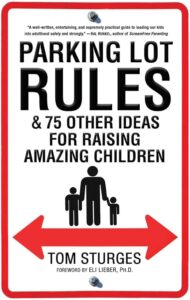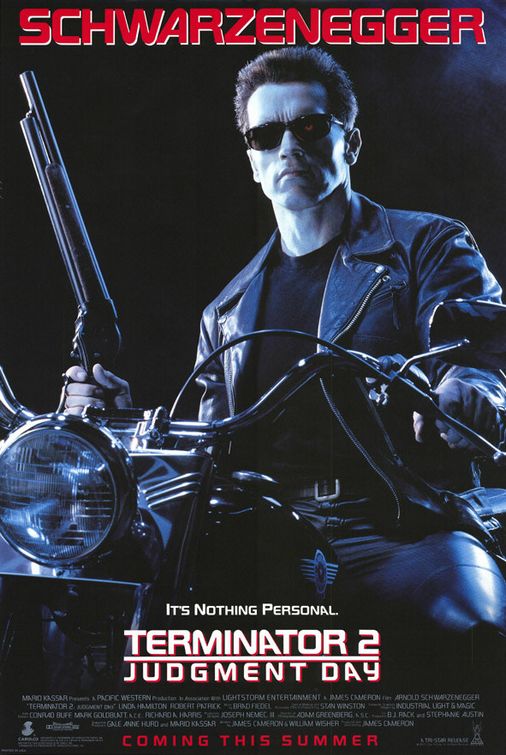The Terminator Calendar
Posted on May 21, 2009 at 3:55 pm
Cinematical does what the producers of the new Terminator movie did not — they sit down with a calendar to try to figure out the Terminator Timeline.
Posted on May 21, 2009 at 3:55 pm
Cinematical does what the producers of the new Terminator movie did not — they sit down with a calendar to try to figure out the Terminator Timeline.
Posted on May 21, 2009 at 8:00 am
Cinematical reports that Toys R Us is selling a Terminator costume for little kids who, of course, are too young to see the movie, which is rated PG-13 and is just a millimeter away from an R. I understand that costumes are supposed to be scary and that children benefit from the opportunity to access the power of the images they find disturbing. But like the fast food toys for movies that children are too young to see, I think it is inappropriate to use products directed at younger children to promote a movie that is made for an older audience. Those who would like to send feedback to Toys R Us about this item can do so here.
Posted on May 20, 2009 at 3:58 pm
Tom Sturges is the author of Parking Lot Rules & 75 Other Ideas for Raising Amazing Children. It is one of the most insightful and useful parenting books I have ever seen and I recommend it highly. I guarantee that even the most functional families will find some good new ideas to improve interaction not just between parents and children but in all relationships.

Sturges has a day job as executive vice president and head of creative affairs for Universal Music Publishing Group, the world’s largest music publisher, and he says it is a “fascinating and interesting job surrounded by remarkable people.” He is also the son of one of the most brilliant writer-directors in film history, Preston Sturges (of “The Lady Eve,” “The Miracle of Morgan’s Creek,” “Palm Beach Story,” “The Great McGinty,” and “Sullivan’s Travels”). But his father died when he was only two, so Sturges had to become the father he wished he had had. I had a wonderful time talking with him about raising children and the lessons he has learned and shares in this book.
When your first son was born, how did you think about the father you wanted to be and the impact it would have on you?
Being a good dad became almost a religion to me. I wanted to be the greatest dad ever, and the only people who could say whether or not I was successful would be my own sons. Along the way I discovered that there were many mistakes I was making or that I saw other parents making and I began to write them down, and that became the book.
My father died very early. He was 58 when I was born and 60 when he died. If I could make sure my children never experienced what I experienced it helped me recover the goodness of my own childhood, it heals you. When my child was the age I was when my father died, I had the date circled in red in the calendar because it was a milestone, passing that day was something I did for him and he did for me. Anything that was painful for you as a child, let’s say there was a day you got chased off the schoolyard or kicked off the cheerleading squad, you can recover that day with your child. You can heal yourself by breaking the chain.
What commitments do you make to your sons?
Children take the mortgage for granted, they take the material things for granted; the important thing is to build a relationship of trust with them. They learn to trust because they realize that you do what you say you will do. So I make Life Promises, and keep them. No hitting, no raised voices, no embarrassing them. This last one is the rule that gets used more than any other.
My son Sam is very sensitive to what the world thinks. After we’ve been playing basketball, when I pull off my t-shirt to change, he says, “Dad! Dad! You’re breaking the No Embarrassing rule!” He gets to say that, and I earn his trust by respecting that he gets to say it. When I do, it is another pebble of trust, and I hope all those little pebbles will build themselves into beautiful bridges of trust.
My favorite of your rules is “smile when you see them.”
That is such an important one! Your children will see a smile on your face and it will give them hope. It is an easy one to forget because we get so caught up with telling them what we think they need to know.
Parents can make a difference just by making sure the child feels welcome before we launch into telling them what to do. Never be too correcting with your child after a sporting event. It’s just “You tried hard” and “I appreciate it.” We can talk about helping you with your hitting tomorrow. I recently returned from Hawaii and saw a mother scolding her child all the way down the aisle of the airplane. She could not see the look on his face, but I could. We have to remember what it feels like to have a big person, who might weigh twice what you do, yelling at you in front of strangers.
And it’s the person whose good opinion you most need.
The currency of parental discipline is disappointment. Your disapproval is so important and powerful that when you are correcting a child you must always whisper. It really works for me. I was upset with my 11 year old yesterday because he lost an important basketball game and did not practice his free throws afterward. I whispered to him, “We could be working harder.” You have to loft them into the sky like a glider, boost them when they fall.
What mistake parents make concerns you the most?
Forgetting the importance of respect. So many of the rules in the book are just about ways to show the child respect. “Yes not what,” for example – simply changing your response to begin with “yes!” instead of “what?” makes a big difference. Never yelling is a sign of respect, too.
That teaches them how to behave respectfully to other people.
Exactly! I donate a lot of time to a program for inner city children. I was speaking to them on Saturday and I said “The key to a good and successful life is to simply always show the most respect.”
And what are you working on next?
We have a new son, whose middle name, Sullivan, is a tribute to my father. Fifty years from now, he will help keep that legacy alive. And I am working on a sequel to Parking Lot Rules, about raising amazing adolescents.
Posted on May 19, 2009 at 3:59 pm
In honor of this week’s release of “Terminator Salvation,” here’s a quiz about the earlier versions.
1. What is the name of the corporation that created the machines that are trying to kill all the humans?
2. What is the name given to the day when the machines took over?
3. In the first movie, what do the women killed by the title character have in common?
4. What is the change that led the computer to view humans as a threat?
5. What legendary science fiction writer is given credit for inspiring the series?
6. Who played the scientist who created the microprocessor that makes the Terminators possible?
7. What name does the Terminator use to ask about the foster family’s dog?
8. What does the young John Connor teach the Terminator to say?
9. Why do John and Kate go to Crystal Peak in “Terminator 3?”
10. What is the significance of the name of the Terminator in the television series, “The Sarah Connor Chronicles?”